
|
There is a Unique Trans Magic Infused Into Every Step of Your Path and You Deserve to Enjoy it Deeply!
What was first puberty like for you? Those of us who knew we were trans, queer, or gender-nonconforming probably spent our teen years actively raging against the process. Others deeper in the closet may have simply sensed that something didn’t feel right.
Compulsory cishet* culture presents puberty as miserable, embarrassing, and extremely inflexible. For queer and TGNC people who are initially excited about their transition, they may begin to view their second puberty with the same negative outlook. Because of anti-queer violence and censorship, we have been deprived of a whole, healthy connection to generations of queer and trans elders. This means that whatever traditions of queer coming-of-age which used to exist seem to be lost to time.
While we mourn that reality, we also are presented with an exciting opportunity to shake off what doesn’t suit us from dominant culture(s) with flamboyant agency, and embrace our second puberty with a wily, trickster joy. Whether you’re micro-dosing, seeking a full hormonal transition, or doing neither, I want to help my trans and queer kin sense our empowerment and potential for magic at this incredible turning point. The single story of transition as a traumatic medical slog that we hope may end with cis acceptance is not the only one. We can dare to feel the parts of second puberty that are actually wonderful, potent, and magical.
You Have Time and Wisdom on Your Side.
In first puberty, most of us were rocked by devastatingly low self-esteem. To suggest that this doesn’t happen to trans and queer adults in second puberty would be very misleading: we still struggle deeply once we come out and become invested in making changes to our gender presentation. The mirror may lie or hurt us, and we grow impatient to see our future self bloom.
Thankfully, as adults in second puberty, we have a great deal more perspective on our feelings than we did as teenagers. We can schedule regular therapy and talk to other queer people who remind us of our worth and beauty at every stage in the journey.
When you’ve faced fears around things like medical access, transphobia, and coming out to those you love, some of the challenges that stymied you as a disempowered 13 or 14-year-old will now feel like child’s play. You aren’t a kid anymore, and the life experience you bring to your second puberty lends you confidence that will help you navigate this time. (It helps that once we start HRT most of us begin to age backward for a time—so it’s hard not to feel yourself!)
You Get to Create Your Own Rituals.
It may not surprise queer readers to know that many cisgender kids grow up into adults who feel deeply uncertain about their identities. Many cis adults aren’t sure if they are “real” men and women, or if they have done enough to prove their gender identities. Trans and queer people also question our validity all the time—the push to be “real” feels so much more important when our survival may depend on “passing.”
The uncertainty we feel due to missing out on adulthood rites of passage can also lead to depression and misdirected anger as uninitiated teens grow older without fully transitioning into self-assured adults.
In second puberty, we can harness this knowledge and forge meaningful initiation traditions that help us grow into grounded, confident adults. You could choose to be recognized by community in a traditional ceremony from your faith. You could set yourself a difficult challenge or goal and find a mentor to help you achieve it. Your initiation could be a private ritual of intention done in Nature. Whatever path you take, slowing down and honoring the spirit of this moment is something most teenagers don’t think about. Now’s your chance to honor your transition in ceremony and grow up into the version of yourself that you’ve always wanted to be.
You Can Seek Community that Celebrates Your Authentic Self.
The greatest treasure in our second puberty is undoubtedly our chosen family, community, and queer kin. If your parents had awful things to say about your changing body the first time, odds are you won’t want them commenting on this transition. If your friends in school thought your bold fashion choices were ‘kind of gay,’ now you can surround yourself with the *definitely gay* crowd who are going to cheer you on with every strut (and share their cute clothes to help you build your closet and your confidence). Seek out people who uplift you, who remind you you are worthy and loved. With the wisdom you’ve gained through the years, you have a better idea of who deserves to be close to you during moments of vulnerability and upheaval. You deserve for your transition to be serenaded by a cheer squad, not by your worst critics.
Second puberty is full of second, third, and fourth chances that bloom in sequence, enriching our experience of life in ways we never thought possible before. People around you may not understand why you are taking a positive outlook—and they are entitled to feel however they feel about their own puberty, but one of your greatest qualities is that you are a free thinker who desires a felt sense of authenticity. Your spirit’s striving for authentic grace and beauty means your true coming-of-age can only be a powerful expression that has never been seen on this earth before.
There is a unique trans magic infused into every step of your path and you deserve to enjoy it deeply.

Liam Harwyn (he/they) is a nonbinary transgender writer and european settler descendant born and raised on stolen lands of Miwok and Pomo people. They graduated from Mills College with a BA in Creative Writing and attended Scottish Universities’ International Summer School for Creative Writing in Edinburgh, Scotland. He is a student of decolonization, antiracism, science fiction, and ecological restoration. Follow him on Instagram @liamharwyn_writer.